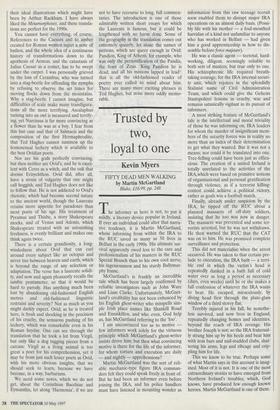Trusted by two, loyal to one
Kevin Myers
FIFTY DEAD MEN WALKING by Martin McGartland Blake, £16.99, pp. 248 The informer as hero is not, to put it mildly, a literary device popular in Ireland. If ever an individual could alter that narra- tive tendency, it is Martin McGartland, whose informing from within the IRA to the RUC saved as many as 50 lives in Belfast in the early 1990s. His ultimate sur- vival apparently owed less to the care and professionalism of his masters in the RUC Special Branch than to his own cool nerve, his ingeniousness and his sturdy Ballymur- phy frame.
McGartland's is frankly an incredible tale which has been largely confirmed by reliable investigators such as John Ware and Liam Clarke. Unfortunately, McGart- land's credibility has not been enhanced by his English ghost-writer who misspells sim- ple Irish place names like Shankill Road and Enniskillen, and who even, God help us, has McGartland referring to the goo'.
I am unconvinced too as to motive — few informers work solely for the virtuous principle which McGartland's ghost-writer insists drove him; but then what convincing motive is there for the life of the informer, for whom torture and execution are daily — and nightly — apprehensions?
Martin McGartland was the sort of reli- able mechanic-type figure IRA comman- ders felt they could speak freely in front of. But he had been an informer even before joining the IRA, and his police handlers must have listened in mounting wonder as information from this raw teenage recruit soon enabled them to disrupt major IRA operations on an almost daily basis. (Possi- bly life with his mother — a foul-mouthed harridan of a kind not unfamiliar to anyone who has worked in Belfast — had given him a good apprenticeship in how to dis- semble before force majeure).
He was a classic agent — teetotal, hard- working, diligent, seemingly reliable to both sets of masters, but true only to one. His schizophrenic life required breath- taking courage, for the IRA internal securi- ty unit, which rejoices in the splendidly Stalinist name of Civil Administration Team, and which could give the Geheim Staatspolizei lessons in cruelty, was and remains satanically vigilant in its pursuit of informers.
A most striking feature of McGartland's tale is the intellectual and moral triviality of those he was informing on, IRA leaders for whom the murder of insignificant mem- bers of the security forces was in reality no more than an index of their determination to get what they wanted. But it was not a means; nor could it be translated into one. Tree-felling could have been just as effica- cious. The creation of a united Ireland is totally unrelated to the activities of the IRA,which were based on primitive notions of organisational and personal gratification through violence, as if a terrorist killing- contest could achieve a political victory, rather as goals win a football match.
Finally, already under suspicion by the IRA, he tipped off the RUC about a planned massacre of off-duty soldiers, insisting that he too was now in danger. The massacre was prevented and some ter- rorists arrested, but he was not withdrawn. He then warned the RUC that the CAT was on to him. He was promised complete surveillance and protection.
This did not materialise when the arrest occurred. He was taken to that certain pre- lude to execution, the IRA bath — a terri- ble end in which the victim's head is repeatedly dunked in a bath full of cold water over as long a 'period as necessary (days, even weeks) until he or she makes a full confession of whatever the IRA wants to hear. He escaped, miraculously, by diving head first through the plate-glass window of a third storey flat.
Terribly injured in his fall, he nonethe- less survived, and now lives in England, repeatedly changing homes and identities, beyond the reach of IRA revenge. His brother Joseph is not; so the IRA fraternal- ly strung him up by his heels and beat him with iron bars and nail-studded clubs, shat- tering his arms, legs and ribcage and crip- pling him for life.
This we know to be true. Perhaps some of what Martin says in this account is imag- ined. Most of it is not. It is one of the most extraordinary stories to have emerged from Northern Ireland's troubles, which, God knows, have produced few enough known heroes. Martin McGartland is one of them.


































































 Previous page
Previous page